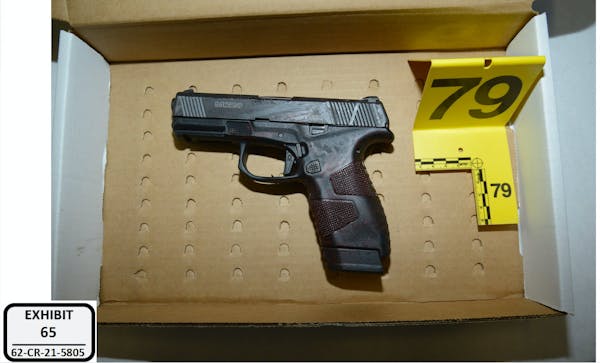A framed portrait of Marquisha "Kiki" Wiley cast a bright smile toward the man who ended her life two years ago when he sprayed bullets through a crowded St. Paul bar.
Terry Lorenzo Brown, the 35-year-old St. Paul man convicted of second-degree murder and other charges for his role in the October 2021 mass shooting at St. Paul's Truck Park bar, gripped a hand to his face as he listened to account after account of what he took from the people who crowded his Tuesday sentencing hearing in Ramsey County District Court.
"This nightmare has senselessly destroyed so many people's lives in such a devastating way," said Beth Wiley, Kiki's mother, before Brown received a nearly 37-year prison sentence.
Kevin Wiley, Kiki's father, raised high a portrait of his daughter and aimed it at her shooter as Beth spoke.
Brown's sentencing wraps up the prosecution of the two men whose conflict with each other led to one of St. Paul's worst-ever shootings on Oct. 10, 2021, inside a crowded bar of about 100 patrons, killing Wiley and injuring 14.
A jury in St. Paul convicted Brown of second-degree murder, four counts of attempted murder and one count of possession of a firearm by a convicted felon following a trial in June. Also that month, 31-year-old Devondre Trevon Phillips received a 29-year sentence for firing the first shots that touched off the brief but chaotic gun battle.
Phillips and Brown exchanged gunfire, striking each other and a dozen bystanders, as Phillips left the bar. Phillips was shot five times, suffering a broken femur and a severed artery in his leg.
Both men sought to apply blame on the other as they mounted legal defenses on claims that they were merely trying to protect themselves from being killed.
Defense attorney Stephen Grigsby, in arguing for a lesser sentence for his client, said Phillips was responsible for creating the carnage of that night and that Brown simply responded to being shot.
Brown, Beth Wiley argued earlier, "knew he had to defend himself that night. But what about the innocent people there that night who had no idea what was going to happen?"
District Judge Carolina Lamas said that it was undisputed that Phillips fired the first shots, but she noted that Brown acted unreasonably by spraying bullets in a crowded bar in response.
Wiley died in the arms of her brother, Kevaughn, who briefly spoke before Lamas sentenced Brown. His voice breaking, he told Brown that Kiki's family was a forgiving one. But he lamented Brown's silence and claims of self-defense throughout the prosecution.
"I want you to sit there and think for a long time: How can you expect a family to forgive you when you haven't even said no condolences or even a sorry?" Kevaughn Wiley said.
Aundrea Wiley, Marquisha's older sister, stood next to her brother and said she now constantly replays the image of her sister dying in Kevaughn's arms. And the memory of a detective with a clipboard confirming at the hospital that "I'm sorry, but Marquisha didn't make it."
She said worry now consumes her each time a loved one is out of the house, with comfort arriving only once she receives a text that they made it home safely.
On Tuesday, Brown apologized to Wiley's family and all others affected by the shooting, in brief remarks to the courtroom.
But he maintained that, as Phillips shot him and continued firing while Brown lay on the ground, he did what "I believe anyone would've done in the same situation and scenario."
Assistant County Attorney Treye Kettwick said the "entire scene was a tragedy and avoidable on two fronts." He pointed to testimony from Brown that Phillips shot at him on an earlier occasion. Illegally possessing a firearm of his own and knowing that Phillips was present at the bar, Kettwick said, Brown chose to stay there and not leave.
"His actions, instead of breaking this cycle of gun violence, was to double down on it," Kettwick said, later adding: "There's no right party in this instance. There are two bad actors in this cycle of gun violence."

Want to share info with the Star Tribune? How to do it securely

'Safe recovery sites' would offer syringes, naloxone and more to people using drugs. The plan could be in peril.
New Minnesota GOP leaders seek peace with party's anti-establishment wing

Who is Republican Lisa Demuth, Minnesota's first House speaker of color?

